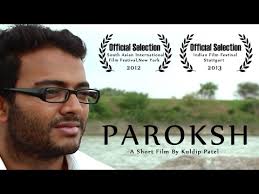
PAROKSH (INDIRECT)
India, 2009, 123 minutes, Colour.
Devya Dutta, Rituparna Sengupta, Kiran Janjani.
Directed by Anup Das.
While the surface might look like many of the Bollywood films, even having some music and songs as background, Paroksh is quite a different kind of film. It is a story of moral and ethical issues.
There is a Mumbai story, occupying the first part of the film where an educated couple, she an upwardly mobile banker and he a businessman, face the issue of having children or not, career or not. This leads to an abortion, decided by the mother, not having the advice of the father. This leads to all kinds of moral issues and questions – and opens up the possibility of surrogacy. Meanwhile in the village, a traditional ceramics artist finds himself in debt and a diminishing clientele. His wife has some children – but other girls from the village have gone to Mumbai to act as surrogates. His wife agrees to go to the city.
With this interconnection between city and country, the issues of career and decisions about children contrast with those of the enthusiasm of the people of the country for bearing children. This reaches a dramatic climax – and leaves the audience asking many questions about their stances on these issues. This is not usual in an Indian film from the west coast – and the film-makers hope to raise the issues not only for people in the city, but for those who watch films in the countryside.
1.Audience response to Indian films? Outside India? Within India? Urban audiences? Audiences in the countryside and villages? The Bollywood background? The serious issues? Combining both styles?
2.A film designed for a wide audience, for enjoyment of a commercial story, for the raising of serious issues?
3.Mumbai, western dress? Technology? Awards? The homes, wealth, the beach house?
4.The contrast with the village, the poor homes, the workplaces, clothes, possessions?
5.The musical score, the songs, illustrating the themes? The title and the translation of Indirect?
6.The introduction, the wealthy world, she and he, their characters, she as ruthless in her business, talking with her husband or not? The trainees, the bosses, business, opportunities, the opening up of career, vice-presidency of the bank? The husband and his life, devoted to business?
7.Tanvi and her becoming pregnant, the dilemma about the pregnancy and her career? Sending emails to her husband? Her friend and discussion? Going to have the abortion without her husband’s opinion? The effect on her, emotionally? The husband and his reaction? Her parents and their traditional values? The husband and the dilemmas about continuing in the marriage or not?
8.The effect on the different parents? Raising the issues of adoption and the discussion of these issues?
9.Tanvi’s friend, discussions, raising the issue of surrogacy? Going to the clinic, the ethical questions, the interviews, the money issues? Surrogacy as a business?
10.The doctor, the opportunities, his mercenary assistant, phone calls to the country, his agents looking for women to bear the children?
11.Village life, the ceramics, Mohan and Gouri? Their happiness together? Desperate for money? The family? The client and his arrogance, rejecting and breaking the idol? The brother and his angers? The greedy man, the massage, his reaction? The agent with loans and demands? As an agent for surrogacy?
12.The issue of surrogacy, the women in the village, their attitude towards giving birth, helping women incapable of giving birth?
13.Gouri and her meeting Tanvi and her husband, the parents and their offer of care, her arrival, the lavish clothes, pampering her?
14.Gouri referring to ‘my baby’, Tanvi and her becoming anxious, her nightmares, imagining the worst, discussing these with her friends? The scans? Gouri and her feeling the baby, Tanvi unable to feel it?
15.The truth about Tanvi being capable of pregnancy, Gouri’s dismayed reaction?
16.Gouri’s fall, its effect? Going to hospital? Desperation? The choice of the death of the child? For the mother to be able to return to her own children in the village? The background of Tanvi, at the dinner, her getting her award, her speech, the achievement?
17.Tanvi and her speech, her husband and the phone call, her return?
18.Gouri and her return to the village? Her final speech to Tanvi, wishing her well, urging her to have children?
19.Tanvi and her husband, their life, happiness, the biological clock, the options, having the child? Happiness?
20.The film as a way of dealing with moral and ethical issues in the complex Indian context? Its relevance for world audiences?